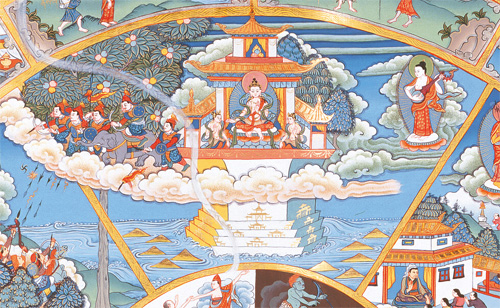Six heavens of the desire realm: Difference between revisions
mNo edit summary |
No edit summary |
||
| Line 47: | Line 47: | ||
===6. Controlling Others' Emanations=== | ===6. Controlling Others' Emanations=== | ||
*Skt. '' | *Skt. ''Paranirmitavaśavartin''; Tib. གཞན་འཕྲུལ་དབང་བྱེད་, ''Shyentrul Wang Jé'', Wyl. ''gzhan 'phrul dbang byed'' | ||
This is the most refined state in which one can be reborn within the desire realm. Gods in this realm enjoy pleasures created magically by other gods. | This is the most refined state in which one can be reborn within the desire realm. Gods in this realm enjoy pleasures created magically by other gods. | ||
Sixteen hundred human years equal one day in this realm. | Sixteen hundred human years equal one day in this realm. | ||
==Alternative Translations== | |||
*3. Heaven Free from Strife (Dharmachakra Translation Committee) | |||
*5. Heaven of Delighting in Emanations (Dharmachakra Translation Committee) | |||
*6. Heaven of Making Use of Others’ Emanations (Dharmachakra Translation Committee) | |||
==Sources== | ==Sources== | ||
Revision as of 11:21, 9 July 2022

The six heavens of the desire realm are (from lowest to highest):
Terrestrial Heavens
1. Heaven of the Four Great Kings
- Skt. Caturmahārājakāyika; Tib. རྒྱལ་ཆེན་རིགས་བཞི་, Gyalchen Rikshyi; Wyl. rgyal chen rigs bzhi
The Four Great Kings, along with their retinues, reside upon the fourth terrace of Mount Sumeru. Upon the lower terraces live, in descending order, the gods of the Ever-Ecstatic, Garland-Bearers, and Vessel-Bearers. The crests of the seven mountain ranges, the sun, the moon, and all the stars also belong to the abodes of the Four Great Kings.
It is said that Vishnu resides in this realm.
Fifty human years equal one day in this realm.
2. Heaven of the Thirty-Three
- Skt. Trāyastriṃśa; Tib. སུམ་ཅུ་རྩ་གསུམ་, Sumchu Tsasum; Wyl. sum cu rtsa gsum
This is the uppermost terrestrial heaven, and is located on the peak of Mount Sumeru.
It contains the city Fair to See, in which Indra is King.
A hundred human years equal one day in this realm.
Celestial Heavens
3. Free of Combat
- Skt. Yāma; Tib. འཐབ་བྲལ་, Tabdral, Wyl. 'thab bral
This is the first celestial heaven. It is located in the space above Mount Sumeru and, as such, it is no longer subject to the attacks of the demi-gods.
Two hundred human years equal one day in this realm.
4. Joyous Realm
- Skt. Tuṣita; Tib. དགའ་ལྡན་, Ganden, Wyl. dga' ldan
The Buddha resided here until the time came to take rebirth in the human realm, and demonstrate the twelve deeds of the supreme nirmanakaya. Before passing from Tushita he prophesied the bodhisattva Maitreya's enlightenment as the buddha to follow him, and placed his crown on Maitreya's head, making him his regent. Maitreya will abide here until the time has come for him to demonstrate the twelve deeds.
Later, the Buddha returned to give teachings to his mother, who had been reborn here after giving birth to him.
It is said that wicked Mara also resides in this heaven.
Four hundred human years equal one day in this realm.
5. Enjoying Emanation
- Skt. Nirmāṇarataya; Tib. འཕྲུལ་དགའ་, Trulga, Wyl. 'phrul dga'
Gods in this realm create and enjoy their own objects of pleasure.
Eight hundred human years equal one day in this realm.
6. Controlling Others' Emanations
- Skt. Paranirmitavaśavartin; Tib. གཞན་འཕྲུལ་དབང་བྱེད་, Shyentrul Wang Jé, Wyl. gzhan 'phrul dbang byed
This is the most refined state in which one can be reborn within the desire realm. Gods in this realm enjoy pleasures created magically by other gods.
Sixteen hundred human years equal one day in this realm.
Alternative Translations
- 3. Heaven Free from Strife (Dharmachakra Translation Committee)
- 5. Heaven of Delighting in Emanations (Dharmachakra Translation Committee)
- 6. Heaven of Making Use of Others’ Emanations (Dharmachakra Translation Committee)
Sources
- Kangyur Rinpoche, Treasury of Precious Qualities
- Mipham Rinpoche, Gateway to Knowledge, Volume II
- Patrul Rinpoche, The Words of My Perfect Teacher
- Gampopa, The Jewel Ornament of Liberation
Further Reading
- Jamgön Kongtrul Lodrö Tayé, Myriad Worlds (Ithaca: Snow Lion, 1995), pages 115-119.